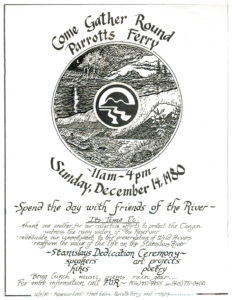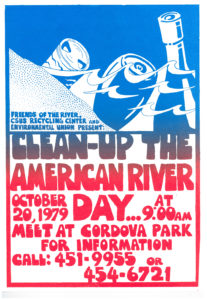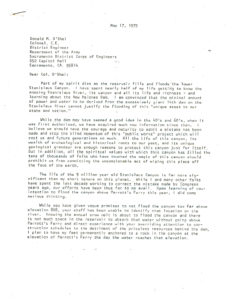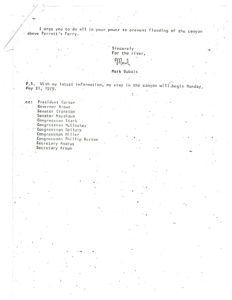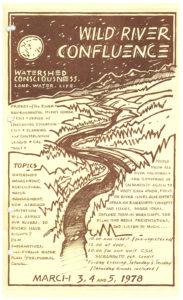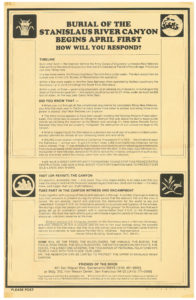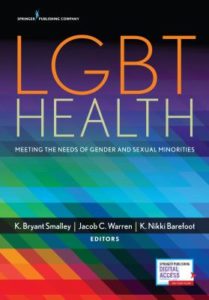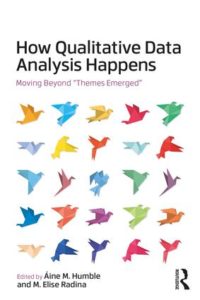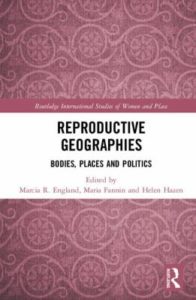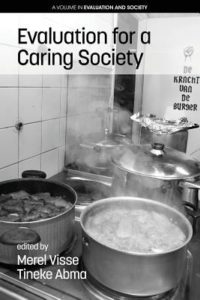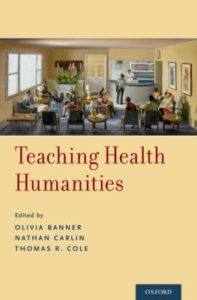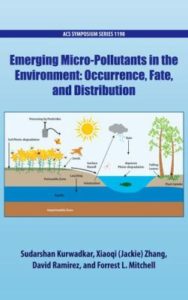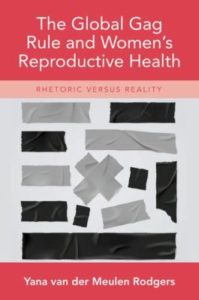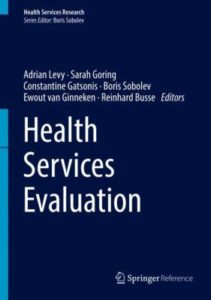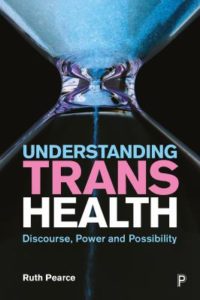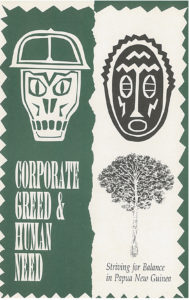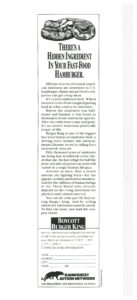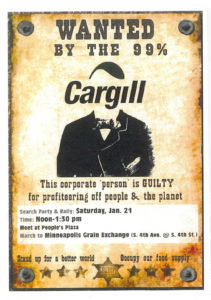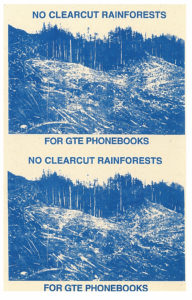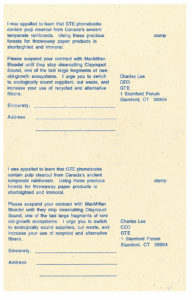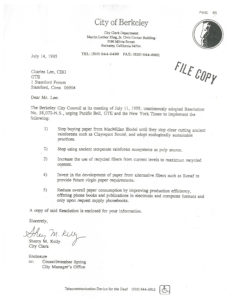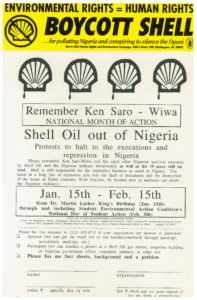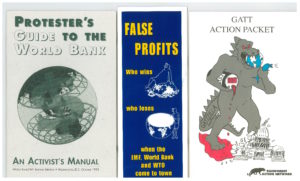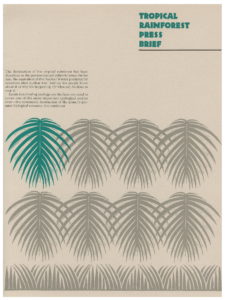Author: UC Berkeley Library
Changes to MLA Bibliography & LION Databases
If you use Literature Online (LION) or the MLA International Bibliography, you may have noticed some changes recently.
The MLA International Bibliography and the MLA Directory of Periodicals will now be found solely on the EBSCO platform. Although the interface looks different, the functionality has not changed. The Bibliography indexes journal articles and other critical scholarship in literature, languages, linguistics, and folklore.

Continue reading “Changes to MLA Bibliography & LION Databases”
The Power of Water: Friends of the River Foundation Records at The Bancroft Library
When we try to pick out anything by itself, we find it hitched to everything else in the Universe.
— John Muir (1838-1914) from My First Summer in the Sierra
On October 2, 1968, the Wild and Scenic Rivers Act was passed by Congress, creating a system of rivers throughout the country to be preserved for generations to come. For the environmental movement gaining momentum in the 1960s this was an important turning point for water protection – although the waterways deemed valuable enough to conserve did not include the Stanislaus River in Northern California, already slated for a large, new dam to be built by the Army Corp of Engineers. The impending filling of the reservoir would cause a 13 mile unimpeded stretch of the river to rise, bringing about the destruction and loss of numerous cultural resources and a highly accessible white water rafting area. Supporters of the dam argued that the New Melones Dam project would create construction jobs, increase the state’s water supply, help with flood control and generate hydroelectric power.
In 1973, a small group of individuals including Gerald “Jerry” H. Meral, Rob Caughlan, David Oke and David Kay decided to form a grassroots conservation organization called Friends of the River to gather signatures to put the Proposition 17 initiative on the ballot thereby adding the Stanislaus River to the list of protected rivers. Though the initiative was placed on the 1974 ballot in California and received significant support from river rafters, environmentalists and others who valued the river as it was, the initiative ended up failing in the election. This defeat didn’t suppress the spirit of the Friends of the River and the group was incorporated in 1975 as the Friends of the River Foundation, a non-profit membership based organization dedicated to river protection under the leadership of Mark Dubois and Jennifer Jennings.
By 1978, the New Melones Dam construction was completed and the spillway and powerhouse were in place in 1979. In May 1979, when the lake was about to be filled with water, Mark Dubois sent a four paragraph typed, signed letter to Colonel Donald M. O’Shei, the Army Corps of Engineers’ Sacramento District Engineer, warning of his impending action to attempt to halt the filling of the New Melones reservoir by hiding in the canyon and chaining himself to a rock in the river. This act of defiance by Dubois brought considerable attention to the already well publicized project and the filling of the lake was halted temporarily.
Though the New Melones reservoir was eventually filled in 1982, one of the campaign’s most influential achievements was to crack open the debate about the cost effectiveness and benefits to society of large dam projects around the globe. No other dams of this magnitude have been constructed in the United States since the completion of the New Melones Dam and the struggle to save the Stanislaus River from the construction of the New Melones Dam remains one of the greatest examples of citizen involvement in American history to stop a dam from being built. The Friends of the River Foundation continues to push for water protection legislation in California through grassroots organizing, public outreach and education.
The Friends of the River Foundation records are now open to researchers at The Bancroft Library. The processing of the Friends of the River Foundation records is part of a two-year grant project funded by the National Historical Publications and Records Commission to make available a range of archival collections relating to environmental movements in the West. A leading resource in the documentation of U.S. environmental movements, The Bancroft Library is home to the records of many significant environmental organizations and the papers of a range of environmental activists.
New Public Health Books
Here is a sample of new Public Health books — many more may be found on our New Public Health Books web guide. Click the links for location: most are at the Bioscience, Natural Resources & Public Health Library; some are at other UCB libraries, or online.
LGBT Health: Meeting the Needs of Gender and Sexual Minorities
How Qualitative Data Analysis Happens: Moving Beyond “Themes Emerged”
Reproductive Geographies: bodies, places and politics
Evaluation for a Caring Society
Teaching Health Humanities
Emerging Micro-Pollutants in the Environment: occurrence, fate, and distribution
The Global Gag Rule and Women’s Reproductive Health: Rhetoric versus reality
Health Services Evaluation
Understanding Trans Health: Discourse, power and possibility
Additions to the Rainforest Action Network Records Now Open at The Bancroft Library
At first I thought I was fighting to save the rubber trees;
then I thought I was fighting to save the Amazon rainforest.
Now I realize I am fighting for humanity.
– Chico Mendes (1944-1988)
The Bancroft Library is pleased to announce that a series of additions to the ongoing Rainforest Action Network records is now open and accessible to researchers. The processing of the Rainforest Action Network records is part of a two-year grant project funded by the National Historical Publications and Records Commission to make available a range of archival collections relating to environmental movements in the West. A leading resource in the documentation of U.S. environmental movements, The Bancroft Library is home to the records of many significant environmental organizations and the papers of a range of environmental activists.
Rainforest Action Network was founded in 1985 by Randy “Hurricane” Hayes and Mike Roselle as a San Francisco based non-profit grassroots environmental group with a mission to protect and preserve the world’s forests and defend the human rights of indigenous people and others affected by unjust land grabs and the depletion of natural resources. Rainforest Action Network’s direct action, education and marketing campaigns apply pressure to governments and corporations to halt illegal logging, manufacturing, selling and use of old growth trees and tropical forests.
The global breadth of Rainforest Action Network’s activities range from Old Growth campaigns in Northern California, the Pacific Northwest and Canada to Tropical Timber campaigns to protect forests and indigenous rights in Central and South America, Africa, Tasmania and Southeast Asia. They also include the Global Finance campaign which organized and supported civil disobedience during the World Trade Organization meetings in Seattle, Washington in 1999.
The Bancroft Library has been collecting Rainforest Action Network records since 2006 and the newly opened additions document the group’s campaigns primarily in the 1990s-2000s. Future additions to the records are expected.
Library Prize Exhibit: Sympathy for the Loss of a Comrade
By Adam Clemons
In early July of 1873, a soldier named John Taylor reported to the hospital at Fort Stockton, Texas complaining of illness. The fort’s doctor, Peter J.A. Cleary, refused to treat him. Instead, he sent Taylor to the guard house as punishment. Three days later John Taylor was dead. Taylor’s fellow soldiers, incensed by what they believed to be racially motivated medical neglect by Cleary, drafted a statement detailing the patterns of abusive treatment of Taylor and calling for a formal investigation into his death. The officers at Fort Stockton responded by placing twenty-one of the soldiers who signed the letter, mostly non-commissioned officers, on trial for attempted mutiny. Though the charge was ultimately downgraded to a failure to follow proper procedure, twenty out of the twenty-one charged soldiers were dishonorably discharged and sent to prison in Huntsville, Texas.



Photos by Jami Smith for the UC Berkeley Library
In “Sympathy for the Loss of a Comrade: Black Citizenship and the 1873 Fort Stockton ‘Mutiny’,” Nick Eskow successfully reconstructed the events at Fort Stockton using library resources such as period publications, government documents, newspapers, and archival collections. Where others have relied on the accounts of the white officers to tell this story, Eskow sought out the perspective of the black soldiers through extensive research and analysis of the historical record. Eskow’s exceptional effort earned him the prestigious 2018 Charlene Conrad Liebau Library Prize for Undergraduate Research, an annual prize awarded to students who have done high-level, course-based research while demonstrating significant use of the Library’s resources.
Eskow’s research is also the subject of the rotating Library Prize Exhibit, located on the second floor of Doe Library between Heyns Reading Room and Reference Hall. Drawing on collections held at UC Berkeley, Fort Stockton, Texas, and the National Archives in Washington, D.C., the exhibit displays some of the documents Eskow used to capture the voice of the black soldiers including a digital version of the original petition letter, which includes a few pages of soldiers’ signatures to show the “X” marks by many names. These marks, meant to stand for “his mark,” indicates that many of the soldiers, who were former slaves, could not sign their names and implies that they could neither read nor write. Other documents on display include an 1868 copy of S.V. Benet’s A Treatise on Military Law and Practice of Courts-Martial, which was repeatedly cited by the white officers at Fort Stockton to support their charge against the black soldiers as well as a detailed timeline of the events at Fort Stockton from the death of John Taylor to the sentencing of the twenty soldiers who signed the petition letter.
The Charlene Conrad Liebau Library Prize for Undergraduate Research is awarded annually to UC Berkeley undergraduates. Any course-based research projects completed at UC Berkeley during the award year are eligible. In addition to a monetary prize for winners – $750 for lower division and $1000 for upper division – award recipients as well as honorable mentions will publish their research in eScholarship, the University of California’s open access publishing platform. Two of the winners are also be featured in an exhibit in the Library.
The exhibit – which was curated by Adam Clemons, Librarian for African and African American Studies, and designed by Aisha Hamilton, Exhibits and Environmental Graphics Coordinator – will be up until November 2019.
Berkeley Research Impact Initiative and the Social Sciences
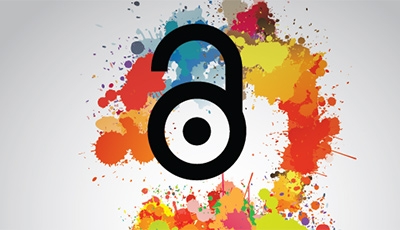 The Berkeley Research Impact Initiative (BRII) aims to foster broad public access to the work of Berkeley scholars by encouraging the Berkeley community to take advantage of open access (OA) publishing opportunities. To accomplish this, it provides funding to Berkeley authors to make their publications free to all readers immediately upon publication.
The Berkeley Research Impact Initiative (BRII) aims to foster broad public access to the work of Berkeley scholars by encouraging the Berkeley community to take advantage of open access (OA) publishing opportunities. To accomplish this, it provides funding to Berkeley authors to make their publications free to all readers immediately upon publication.
Making scholarly work available open access means that there is barrier-free access to research output and that it is not locked behind a paywall. This means there is potential for wider readership and greater impact. However, as publishers have increasingly been charging authors sometimes substantial amounts for “unlocking” their work and making it OA, many authors need financial assistance. With Berkeley’s commitment to making its scholarly outputs OA, the BRII program is the natural response to this situation.
Berkeley authors who have had an article accepted by an open access journal that charges authors an Article Processing Charge (APC) may apply to BRII for reimbursement. Similarly, authors of scholarly books may apply to BRII to for a book subvention. While many of the authors funded are in life and medical sciences or natural resources, a growing number of Berkeley authors in the social sciences have published open access using BRII funding.
If you have questions about the BRII program or open access, talk to your subject librarian.
Below is a very brief list of a few recent BRII-funded articles in the social sciences, listed by the department affiliation of the Berkeley author. Thanks to the assistance of BRII, these articles are free and openly available for any and all users.
Anthropology
Yurchak, Alexei. 2017. “The Canon and the Mushroom: Lenin, Sacredness, and Soviet Collapse.” HAU: Journal of Ethnographic Theory 7 (2): 165–98. https://doi.org/10.14318/hau7.2.021.
Archaeological Research Facility
Lightfoot, Kent G., and Sara L. Gonzalez. 2018. Metini Village: An Archaeological Study of Sustained Colonialism in Northern California.
Institute of Governmental Studies
Geography
Jadhav, Adam, Sharolyn Anderson, Michael J. B. Dyer, and Paul C. Sutton. 2017. “Revisiting Ecosystem Services: Assessment and Valuation as Starting Points for Environmental Politics.” Sustainability 9 (10): 1755. https://doi.org/10.3390/su9101755.
Haas School of Business
Wagner, Zachary, John Bosco Asiimwe, William H. Dow, and David I. Levine. 2019. “The Role of Price and Convenience in Use of Oral Rehydration Salts to Treat Child Diarrhea: A Cluster Randomized Trial in Uganda.” PLOS Medicine 16 (1): e1002734. https://doi.org/10.1371/journal.pmed.1002734.
Linguistics
Bakst, Sarah, and Keith Johnson. 2018. “Modeling the Effect of Palate Shape on the Articulatory-Acoustics Mapping.” The Journal of the Acoustical Society of America 144 (1): EL71–75. https://doi.org/10.1121/1.5048043.
Psychology
Diamond, Allison E., and Aaron J. Fisher. 2017. “Comparative Autonomic Responses to Diagnostic Interviewing between Individuals with GAD, MDD, SAD and Healthy Controls.” Frontiers in Human Neuroscience 10. https://doi.org/10.3389/fnhum.2016.00677.
Marcelle, Enitan T., Laura Nolting, Stephen P. Hinshaw, and Adrian Aguilera. 2019. “Effectiveness of a Multimodal Digital Psychotherapy Platform for Adult Depression: A Naturalistic Feasibility Study.” JMIR MHealth and UHealth 7 (1): e10948. https://doi.org/10.2196/10948.
Zieve, Garret G, Laura P Richardson, Katherine Katzman, Heather Spielvogle, Sandy Whitehouse, and Carolyn A McCarty. 2017. “Adolescents’ Perspectives on Personalized E-Feedback in the Context of Health Risk Behavior Screening for Primary Care: Qualitative Study.” Journal of Medical Internet Research 19 (7): e261. https://doi.org/10.2196/jmir.7474.
School of Information
Maillart, Thomas, Mingyi Zhao, Jens Grossklags, and John Chuang. 2017. “Given Enough Eyeballs, All Bugs Are Shallow? Revisiting Eric Raymond with Bug Bounty Programs.” Journal of Cybersecurity 3 (2): 81–90. https://doi.org/10.1093/cybsec/tyx008.
School of Social Welfare
Aguilera, Adrian, Emma Bruehlman-Senecal, Orianna Demasi, and Patricia Avila. 2017. “Automated Text Messaging as an Adjunct to Cognitive Behavioral Therapy for Depression: A Clinical Trial.” Journal of Medical Internet Research 19 (5): e148. https://doi.org/10.2196/jmir.6914.
Sociology
Boutyline, Andrei. 2017. “Improving the Measurement of Shared Cultural Schemas with Correlational Class Analysis: Theory and Method.” Sociological Science 4 (May): 353–93. https://doi.org/10.15195/v4.a15.
Preprints in social science research
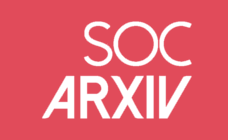

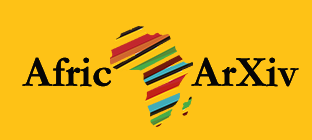
As the movement towards open access to scholarly content gathers momentum, the use of preprints is a central feature. What is a preprint? Before a scholarly research paper has gone through the time consuming peer review process for publication for electronic or print publication in a journal, it is in a form that some scholars refer to as “preprint” (also sometimes called a “working paper,” or simply an unpublished manuscript). Often at this stage the manuscript/paper can be posted and made freely available on a preprint depository or server where scholars can seek an informal kind of peer review from other scholars in their field and also stake a claim to their particular research area.
The Center for Open Science which provides technology and services for preprint management, lists among the goals of preprint depositories:
- Improve accessibility of scholarship
- Facilitate timely feedback on scholarship
- Address delays in research publishing
- Improve scholarly communication
Many disciplines now host printer servers. They were developed in the early 1990s in the high energy physics community with arXiv (the X represents the Greek letter chi, so the word is pronounced “archive”), which was hosted at Los Alamos National Lab and eventually moved to Cornell. Relevant preprint servers in the social sciences include:
- SocArXiv is an open archive for social science research housed at the University of Maryland. Papers are moderated before they appear in SocArXiv to ensure, among other things, that the research is scholarly, relevant to the subject areas supported by SocArXiv, and uses correct attribution. Those posting their papers are encouraged to post accompanying data and code.
- PsyArXiv with a goal of facilitating the rapid dissemination of psychological research, PsyArXiv was created by the Society for the Improvement of Psychological Science (SIPS) and the Center for Open Science.
- AfricArXiv, launched in June 2018, is an interdisciplinary, multilingual resource for scholars based on the African continent or those conducting research in or about Africa.
If you are interested in which depository or server might be a good fit for your own research, either for depositing or for accessing content, feel free to contact the library.
OHC Director’s Column, May 2019
Every April, as the school year is fast coming to a close, the Oral History Center hosts its very own commencement ceremony. For seven years running, we have produced this event to celebrate the oral history class of that year — meaning we thank and honor those people whose interviews were completed in the previous year. The Oral History Class of 2019 numbered some 111 individuals who participated in a number of oral history projects ranging from environmental regulation and wine growing to philanthropy and scientific discovery to opera and an army base.
This very special event gives us an opportunity to reflect on what we do — the meaning of oral history to us, to our narrators, and to the community at large. This year we were thinking about how oral histories “make history” in several ways: The interviews, once recorded and made available to the public, provide the raw material that is then used for the making of historical narratives by historians, journalists, students, you name it; the interviews offer historical narratives and analysis on their own, and thus they are one account of history, maybe the best first draft of history; and, perhaps most importantly, those we interview have already made history by living their lives — by building corporations, participating in social movements, creating works of art, running for political office, serving in the military, mentoring students . . . by making wine! History happens — and has happened — but through the work of the Oral History Center, and the generous and essential contributions of our narrators, history is made.
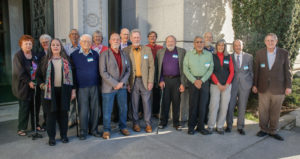
In advance of the event, I asked my colleagues for some examples of moments from their interviews when history was made — when something was told that seemed new to the historical record or in some way demanded a rethinking of it; when a narrator provided an account of a previously unrecognized contribution made — really any example of when history was made.
Amanda Tewes, in her first interview for the center, interviewed Jeanne Rose, who joined us the for event, which was held on this year on Thursday, April 25. Jeanne is a remarkable woman who, in her interview, provided deep insight into something that most people think they know well: the 1960s counterculture. In her telling, we learn of a loose-knit group who were the first 100 to populate the Haight-Ashbury, their deep connections to Big Sur, and how they began to change history with the “Summer of Love” in 1967. We further learn that 60s counterculture didn’t die at the infamous and bloody Altamont concert (which she attended) as the majority of her interview covers the 1970s and beyond when she became an influential herbalist and aromatherapist. With Jeanne Rose, the ideals and the spirit of the 60s live on. Jeanne Rose made history.
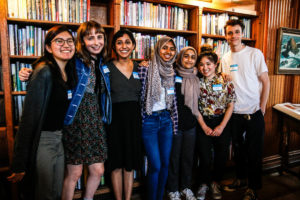
Maggie Deng, Carla Palassian, Gurshaant Bassi, Tasnima Naoshin, Aamna Haq, Laurel Fujii, Ben Satzman. Not pictured: Yarelly Bonilla-Leon, Cindy Jin, KD Mireles, Mason Osberg.(Photo by J.Pierre Carrillo for the UC Berkeley Library)
Todd Holmes, a historian with the Center since 2016, has created a remarkable project documenting the origins of the academic field of Chicano/a Studies, and for this he interviewed Ed Escobar, an Arizona State professor. In his oral history, Escobar tells how he pioneered some of the earliest Latino history courses — out of necessity because there were none. Teaching on the East Coast and then the midwest he learned that the Mexican American experience did not resonate like it did in California. But the Cuban, Puerto Rican, Dominican did. So he put together one of the first Latino history classes on those regions, expanding the definition of Latino and Latino studies in the process. Ed Escobar made history.

We have been fortunate to partner with the East Bay Regional Park District for a few years now and we’ve done a few dozen interviews already — covering many different topics from ranching to public education. Shanna Farrell, who is the project director and lead interviewer, shared with me a moment in her interview with Lawson Sakai. Sakai’s parents were from Japan, so in World War II, his family left the mandated West Coast exclusion area to avoid internment, ultimately settling in Colorado. They returned to California and to farming after the war, but with no money and an unwelcoming attitude of locals, this wasn’t easy. Enter Driscoll Farms, which is a larger grower of fruits today. Immediately after the war, they offered the returning Japanese-Americans a good deal, which included a 50/50 split on profits from the strawberry harvest. According to Sakai, this helped many families back on their feet after the war, allowing them to earn enough money to buy their own farms and thus independence. Shanna said, “I scoured my food history books and didn’t find any information about this. I felt like I had stumbled upon a hidden historical gem.” Lawson Sakai made history.
This past year we renewed our long-running partnership with the Sierra Club to document the organization’s history, and Roger Eardley-Pryor conducted two interviews this year, one with former president Michele Perrault. Roger recalled for me how this interview provides a unique and personal window into the international dimensions of environmentalism. Perrault told stories of traveling to the Soviet Union, China, and India in the early 1990s where she and her colleagues networked with proto-environmental groups, teaching them how to organize and what the key issues were. Their work resulted in, among other things, the creation of some of the first nature preserves in those countries and the establishment of the robust network that is in place today. Michele Perrault made history.
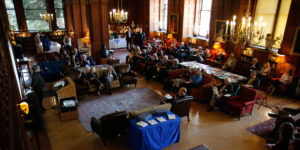
In the coming weeks and months, we will release the oral histories that are not already posted online. This past year we conducted at least 500 hours of new interviews and we are deeply grateful for the support of numerous individuals and institutions for making this work possible. Soon we will begin to post the names of these sponsors on our website so you can thank them too. In the meantime, enjoy the photos and our video from the commencement, highlighting interviews from the Oral History Center Class of 2019.
Our 10-minute video features highlights from the interviews of all of the narrators who were able to attend commencement, plus some bonus interviews. Our remarkable narrators share their insights about nature, science, art, the university, wine making, and more.
Martin Meeker, Charles B. Faulhaber Director, Oral History Center, UC Berkeley
Over the decades, the Oral History Center has conducted more than 4,000 interviews on almost every topic imaginable. As part of UC Berkeley’s commitment to open access, the transcripts are available to researchers and the public at no cost, and almost all of the transcripts are available online. Search our vast collection.
Welcoming Ann Glusker
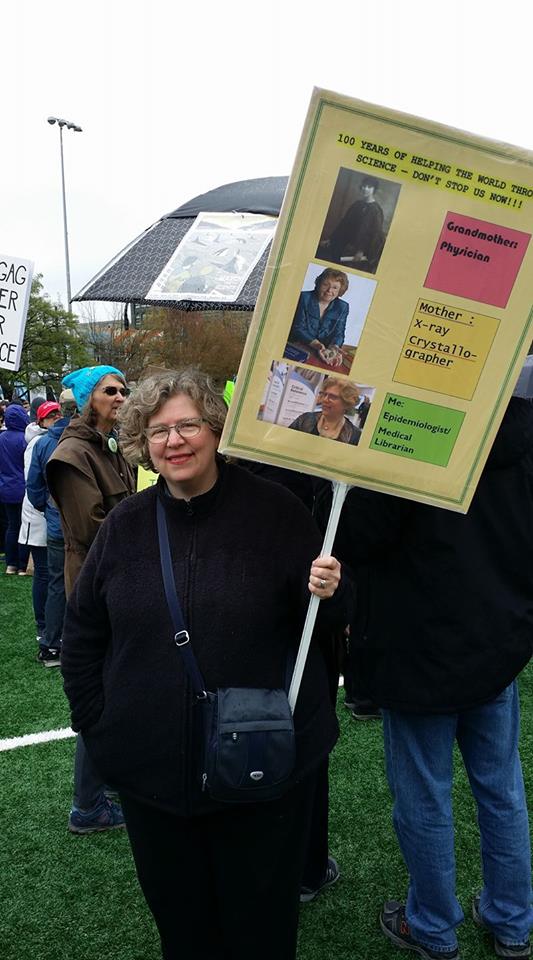 Ann Glusker has recently joined the UC Berkeley Library’s Social Sciences Division as our Sociology, Demography, & Quantitative Research Librarian. Most recently she was the Research & Data Coordinator for the Pacific Northwest regional office of the National Library of Medicine, based at the University of Washington Health Sciences Library in Seattle. She’s also worked as a librarian at The Seattle Public Library, and at the medical library of Kaiser Permanente Washington. In addition, before changing careers to librarianship, she worked as an epidemiologist for the Seattle-King County Public Health department, after studying sociology, demography and public health at the University of Washington and the University of Pennsylvania. She looks forward to working with the Cal community to meet users’ information needs, and is very pleased to be working in a place and a job which incorporates the full range of her interests and experiences.
Ann Glusker has recently joined the UC Berkeley Library’s Social Sciences Division as our Sociology, Demography, & Quantitative Research Librarian. Most recently she was the Research & Data Coordinator for the Pacific Northwest regional office of the National Library of Medicine, based at the University of Washington Health Sciences Library in Seattle. She’s also worked as a librarian at The Seattle Public Library, and at the medical library of Kaiser Permanente Washington. In addition, before changing careers to librarianship, she worked as an epidemiologist for the Seattle-King County Public Health department, after studying sociology, demography and public health at the University of Washington and the University of Pennsylvania. She looks forward to working with the Cal community to meet users’ information needs, and is very pleased to be working in a place and a job which incorporates the full range of her interests and experiences. 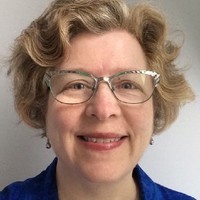
Coastal Tales: The Long Struggle to Preserve California’s Coast – New Podcast Just Launched!
by Todd Holmes
“The true history of the Coastal Commission is what you don’t see, namely the developments along the coast the agency either denied or significantly scaled back.”
In 1972, the citizens of California voted overwhelmingly to create a new agency charged with regulating all development along the state’s coastline, an agency that became known as the California Coastal Commission. For nearly 50 years, the Commission has worked with coastal communities to shape development along California’s shore, efforts guided by the dual aims of environmental protection and public access. It is often said that the true history of the Coastal Commission is what you don’t see, namely the developments along the coast the agency either denied or significantly scaled back. This “unseen” history stands at the heart of the 15-episode podcast, Coastal Tales: The Long Struggle to Preserve California’s Coast, a production of the Oral History Center at UC Berkeley in partnership with the Bill Lane Center for the American West at Stanford University. We’ve just launched the pilot episode about saving Lighthouse Point in Santa Cruz, and the rest of the podcast is slated to be released in the fall of 2020.
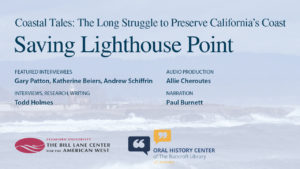
The pilot episode, “Saving Lighthouse Point,” tells the story of the fight in Santa Cruz during the early 1970s against massive development that sought to turn one of the city’s last open parcels of coastal land into a bustling tourist and business hub. Bolstered by the creation of the Coastal Commission, the citizens of Santa Cruz organized and challenged the city council’s support of the project, ultimately saving Lighthouse Point. The successful campaign not only came to stand as a testament to the Coastal Commission and its influence in many coastal communities, but also would prove a watershed moment in the history of Santa Cruz.
Each episode of the podcast will feature a specific site on the state’s coastline and detail the story of a proposed development that, if not for the Coastal Commission, would have significantly altered those sites and communities forever. Led by Todd Holmes, a historian at the Oral History Center and affiliated scholar with Stanford’s Bill Lane Center, the podcast draws on oral history interviews currently underway with former staff and commissioners of the agency, as well as community activists closely involved with the Commission over the decades. The project also draws on Holmes’ research conducted with the California Coastal Commission Project, which the Bill Lane Center initiated in 2014. When complete, the 15 episodes of Coastal Tales will be housed on a dedicated website that will feature the full transcripts of the interviews along with additional information and resources on the history of the Commission. The public will also eventually be able to access the episodes at the sites themselves with the scan of a QR code.
If you’d like to learn more about this project, please contact Todd Holmes at todd.holmes@berkeley.edu or 510-666-3687. You can also support our future episodes by writing California Coastal Commission in the special instructions section of the donation form.
Listen to the pilot episode, read the oral histories, and and be sure to stay tuned for more information!
